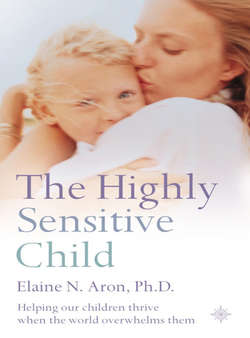Читать книгу The Highly Sensitive Child: Helping our children thrive when the world overwhelms them - Elaine N. Aron, Elaine N. Aron Ph.D. - Страница 9
Chapter One Sensitivity A Better Light on “Shy” and “Fussy” Children
ОглавлениеThis chapter helps you decide if you have a highly sensitive child and explores the trait thoroughly. It also provides more knowledge about all of your child’s inherited temperament traits. Our goal will be to free you of any misconceptions you may have heard about sensitive children. Finally, we will distinguish high sensitivity from actual disorders (which it is not).
Well, if he were my child, he’d eat what was set before him.”
“Your daughter is so quiet—have you considered seeing a doctor about that?”
“He is so mature, so wise for his age. But he seems to think too much. Don’t you worry that he isn’t more happy and carefree?”
“Jodie’s feelings are so easily hurt. And she cries for other kids, too, when they are teased or hurt. And during the sad parts of stories. We don’t know what to do for her.”
“In my kindergarten class, everyone participates in group time, but your son refuses. Is he this stubborn at home?”
Are these sorts of comments familiar to you? They are to the parents I interviewed for this book. They had heard all sorts of well-intentioned comments like these from in-laws, teachers, other parents, and even mental health professionals. If you’ve received such comments, it is almost surely a sign that you are the parent of a highly sensitive child (HSC). And, of course, they are troubling, because you’re hearing that something is odd or wrong with your child, yet you find your child marvelously aware, caring, and sensitive. Furthermore, you know that if you followed the well-intentioned advice, like forcing your child to eat foods he dislikes, socialize when he does not feel like it, or taking him to a psychiatrist, your child would suffer. On the other hand, if you follow the lead of your child, he thrives. Yet the comments keep coming, so you wonder if you’re a bad parent and if your child’s behavior is your fault. I have heard this same story over and over.
